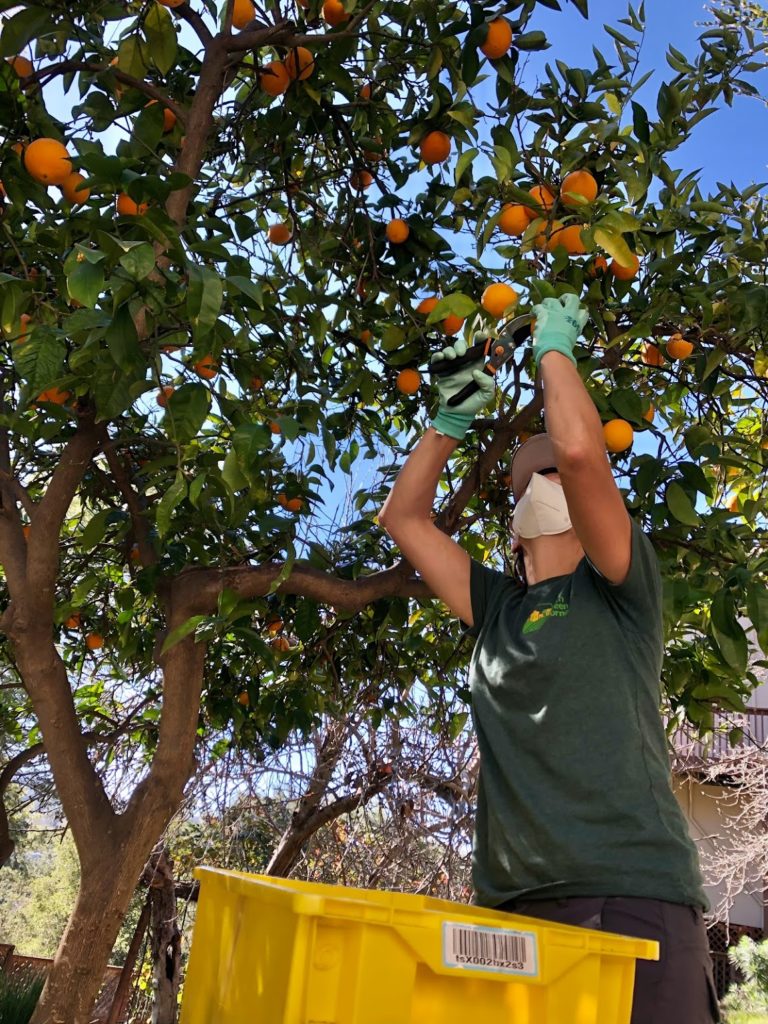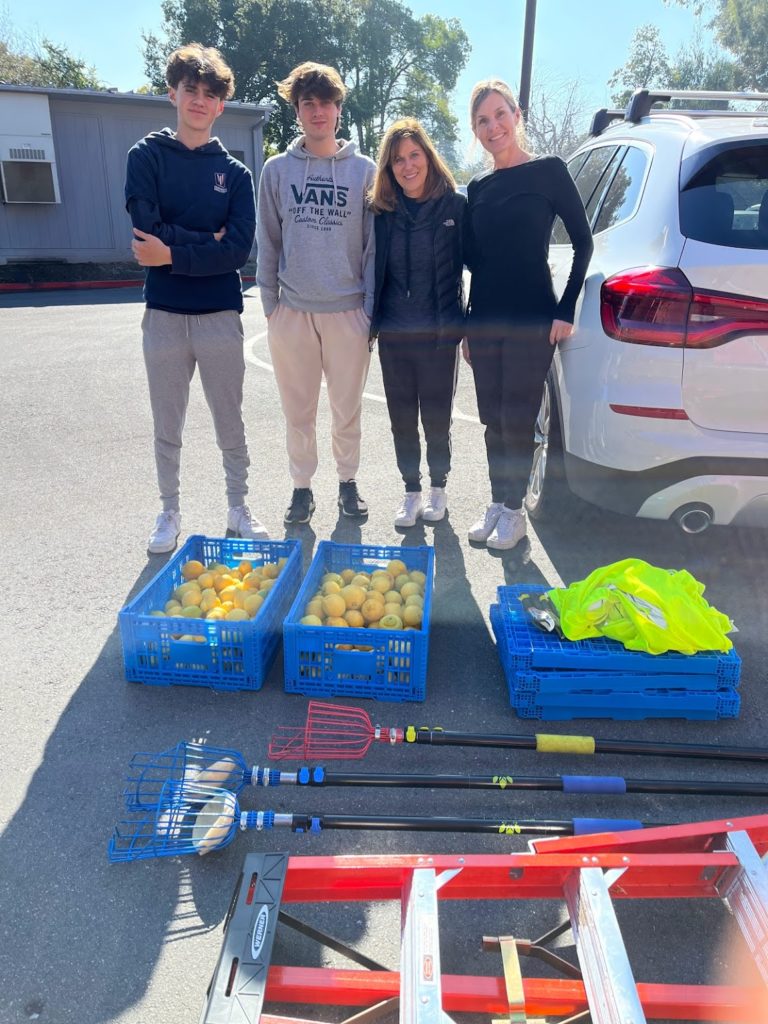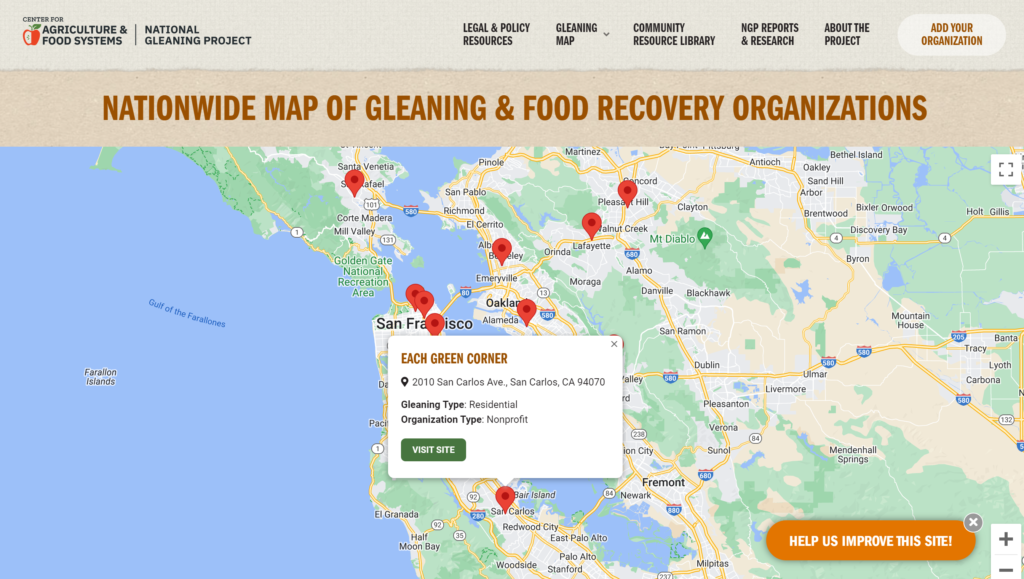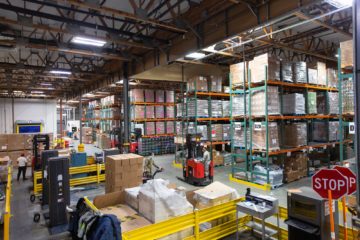Written by Taylor Mogavero, Program Coordinator
You can now find Each Green Corner on the gleaning map created by the National Gleaning Project!
Wait — What is gleaning? And why is it important?
Gleaning is the practice of collecting unharvested crops and distributing them to food insecure populations. This is such an important act because it not only reduces food waste, but also provides food to those who do not have an adequate supply.
Why is Each Green Corner included on the gleaning map?
One of the many programs at Each Green Corner is the Backyard Harvest program. On the 1st Saturday of every month, we go to our neighbors’ backyards and harvest their unused produce. We mostly harvest citrus trees. Did you know a mature citrus tree will produce about 150-250 pounds of citrus every year? That’s a lot of fruit! All the produce we collect gets donated to the Samaritan House of San Mateo or Second Harvest of Silicon Valley. The produce we donate provides meals for low-income families that very same day.
How can I help?
Volunteer to be a harvester! We are always in need of volunteers to help harvest on our Backyard Harvest Days. Backyard Harvest Days are the 1st Saturday of every month from 9:30am-12pm. Meet us at the Arundel Living Campus (2010 San Carlos Ave) and we will give you the harvesting supplies and tell you your route. Check out our calendar for our next event! Email volunteer@eachgreencorner.org if you have any questions or would like to harvest on a different day.
Donate your backyard produce! Do you have more citrus than you know what to do with? Let us harvest your trees! We can have volunteers harvest your produce on our next Backyard Harvest Day, or you can harvest your own and we will pick it up for you. Fill out this form or email volunteer@eachgreencorner if you are interested.


What is the National Gleaning Project?
The National Gleaning Project is a national network that connects gleaning and food recovery organizations across the United States. The National Gleaning Project also provides access to related law and policy resources and samples of waivers, handbooks, and other documents to help support the work of these organizations. (National Gleaning Project)
The National Gleaning Project states:
“Hunger does not result from food shortages, but from unequal distribution. The United States produces enough food to supply every person living in it with 1 ½ times their estimated daily calorie requirement. However, a number of policy decisions and structural factors, such as supermarket redlining, systemic racism, and income and wealth inequality, contribute to our current and entrenched food system in which not everyone has access to the food they need. The Economic Research Service of the USDA found that over the course of 2020, 10.5 percent of households in the US were food insecure, meaning that they ‘were uncertain of having . . . enough food to meet the needs of all their members.’ People of color consistently have higher rates of food insecurity and poverty, and are harder hit during economic downturns. We acknowledge that this is not accidental and results from racism designed into the food and larger economic systems.
Food donation and food banks can fill in gaps, but the charitable food donation system is not big enough, efficient enough, or the right way to solve hunger. To bolster food security, we must support and advance workers’ rights, food sovereignty, and economic justice to ensure that everyone has the means, ability, and opportunity to provision their own food.
Gleaning can support immediate needs, as well as other aims. Many organizations find that gleaning days lend themselves to forging connections and building community. It’s likely that short-term food insecurity will persist during times of transition, at the loss of a job, for example. Gleaning can be useful to fill in gaps during these transitions. In the long term, the National Gleaning Project team will continue to work toward a country and a world of food equity and food justice, and in the meantime, hopes that gleaning can support ‘survival pending revolution.'” (National Gleaning Project)
Check out the gleaning map, legal & policy resources, reports, and research on the National Gleaning Project website!



0 Comments